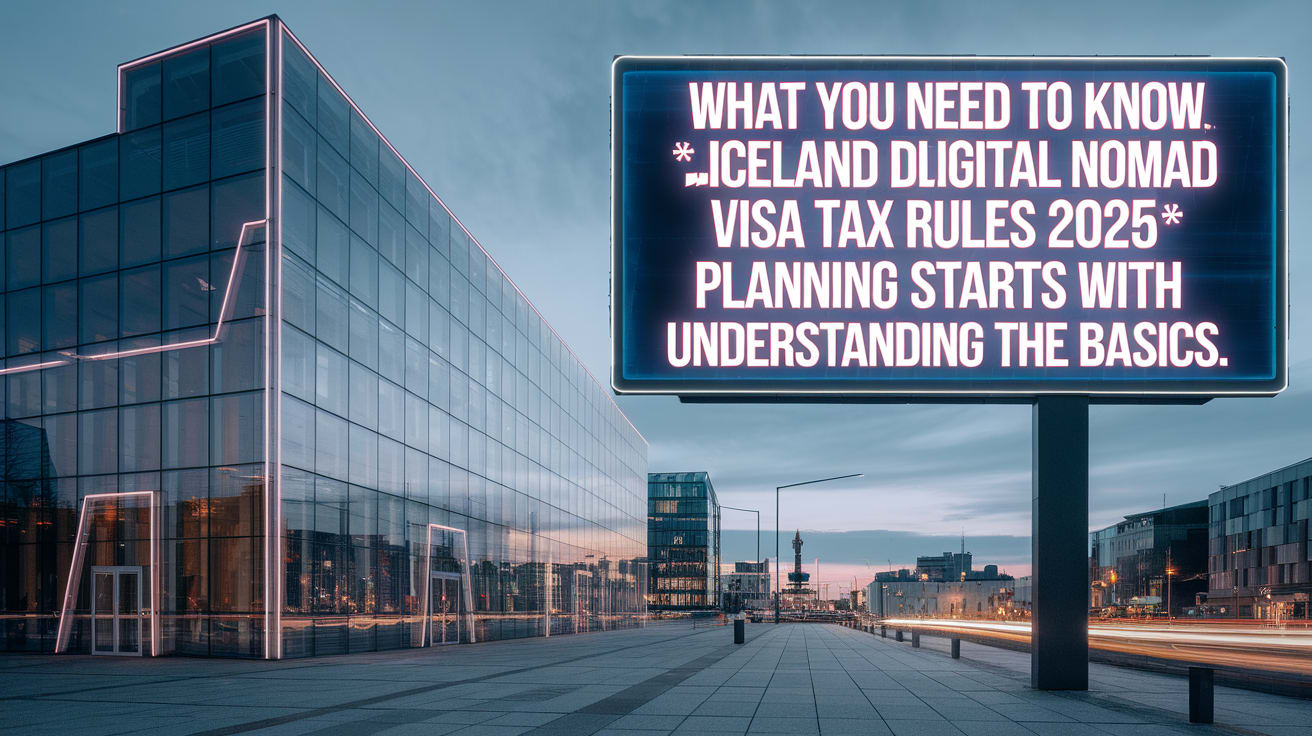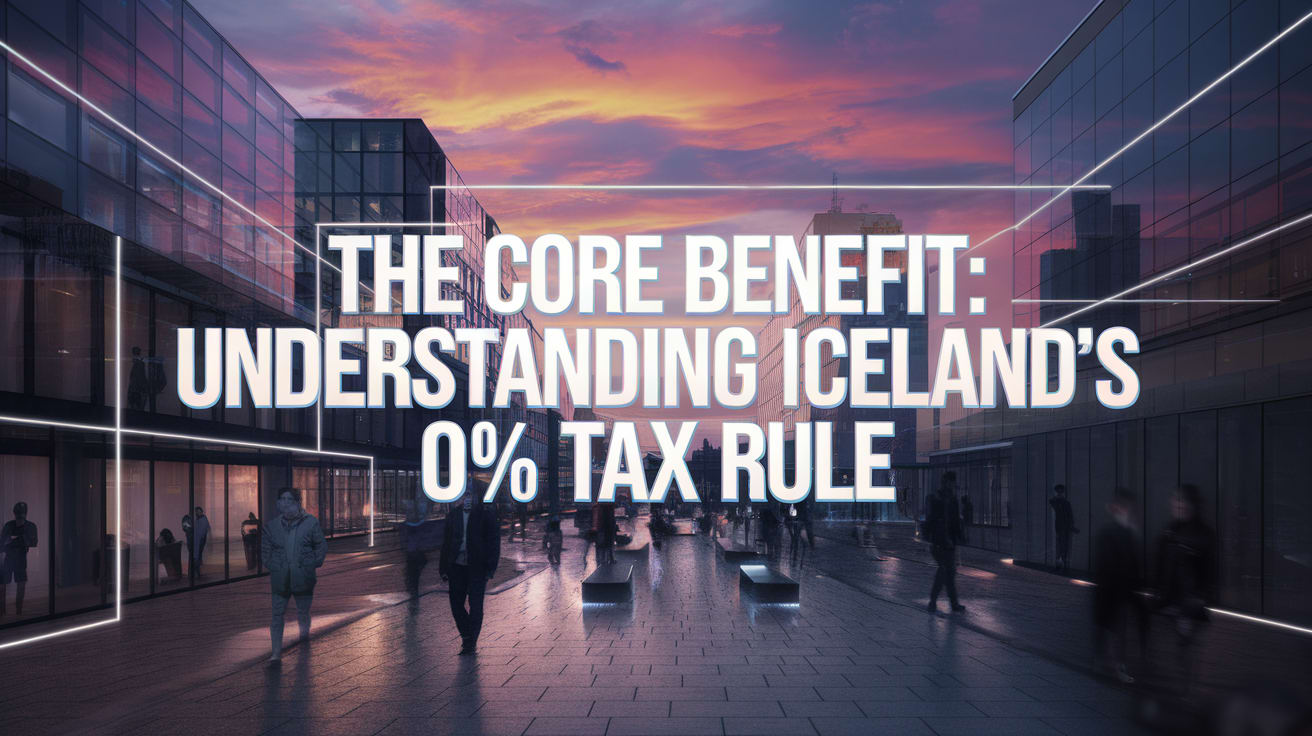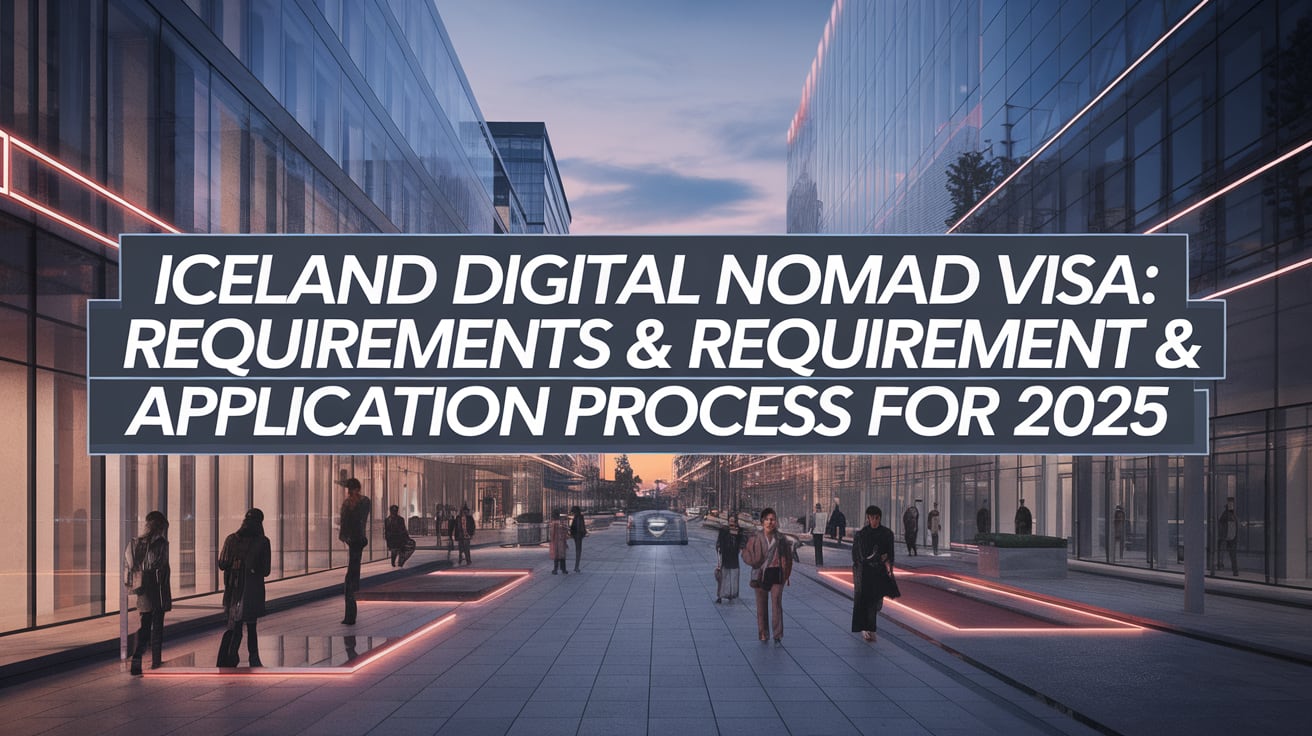Iceland digital nomad visa tax rules 2025
Imagine finishing a productive morning of remote work in a cozy Reykjavík café, then spending your afternoon hiking to a steaming thermal river or watching a geyser erupt. Now, imagine checking your b...

What You Need to KnowIceland digital nomad visa tax rules 2025 planning starts with understanding the basics.
Authority Insight: We grounded this article in guidance from Wikipedia and Bbc so every recommendation reflects the latest policy and on-the-ground expertise for Iceland digital nomad visa tax rules 2025.
Imagine finishing a productive morning of remote work in a cozy Reykjavík café, then spending your afternoon hiking to a steaming thermal river or watching a geyser erupt. Now, imagine checking your bank account and seeing that every dollar, euro, or pound you earned is untouched by local Icelandic income tax. This isn't a fantasy. For a select group of high-earning professionals, Iceland's digital nomad visa offers a powerful incentive: a 0% local income tax rate on foreign-earned income.
However, this incredible benefit comes with a rulebook as complex as the country’s volcanic landscapes. First launched in October 2020, the visa is designed for temporary stays of up to 180 days and targets established professionals who can comfortably afford one of the world's most expensive countries. Understanding the nuances is crucial, as holders are not considered tax residents and remain fully liable for taxes in their home country. This guide cuts through the legal jargon to provide the practical, actionable information you need to determine if this unique opportunity is the right fit for your 2025 travel and work plans.
Key Takeaways
- 0% Local Income Tax: Visa holders pay no Icelandic income tax on their foreign-sourced earnings for the duration of their stay.
- High Income Threshold: A strict minimum monthly income of ISK 1,000,000 (approx. $7,300 USD) for a single applicant is required.
- Temporary Stay Only: The visa is valid for a maximum of 180 days (about 6 months) and cannot be extended or renewed. You must wait 12 months before reapplying.
- Home Country Tax Liability: You are not an Icelandic tax resident and remain fully responsible for taxes in your home country. Professional tax advice is essential.
- Specific Eligibility: The visa is for non-EU/EEA/EFTA citizens who already have visa-free access to the Schengen Area.

The Core Benefit: Understanding Iceland's 0% Tax Rule If you're considering other European destinations, check out the Estonia Digital Nomad Visa.
The primary allure of Iceland's long-stay visa for remote workers is its straightforward and highly attractive tax policy. Unlike many other digital nomad visas that can create complex tax residency situations, Iceland's approach is refreshingly simple: you are not considered a local tax resident, and therefore, you are not subject to Icelandic income tax on your foreign earnings.
What "0% Local Tax" Really Means for Your Wallet
When Iceland says you pay no local income tax, they mean it. For the up to 180 days you're permitted to stay, your salary or business income from foreign sources will not be taxed by the Icelandic Tax Authority (Skatturinn). This is a significant departure from countries where staying beyond 183 days automatically triggers tax residency.
This status is confirmed by the fact that visa holders are not issued a Kennitala, Iceland's national identification and social security number, which is the cornerstone of residency and tax obligations in the country.
However, it's critical to understand the limitations of this benefit:
- Foreign Income Only: This tax exemption applies exclusively to income earned from your remote work for companies or clients outside of Iceland. You are strictly prohibited from earning any income from Icelandic sources.
- No Access to Social Benefits: Without a Kennitala, you cannot access Iceland's public healthcare, unemployment benefits, or other social services funded by local taxes. This is why comprehensive private health insurance is a mandatory visa requirement.
- Consumption Taxes Still Apply: You will still pay the Value Added Tax (VAT), known as Virðisaukaskattur (VSK) in Icelandic, on all goods and services you purchase in the country. The standard VAT rate in Iceland is 24%, with a reduced rate of 11% for items like food, hotels, and books.
The Most Important Caveat: Your Home Country Tax Obligations
The 0% local tax rule does not mean your income is entirely tax-free. You remain a tax resident of your home country and are fully liable for any income taxes due there. This is the single most critical point to understand and plan for.
For example, a U.S. citizen working remotely in Iceland must still file a U.S. tax return. They may be able to use mechanisms like the Foreign Earned Income Exclusion (FEIE) or the Foreign Tax Credit (FTC) to reduce their U.S. tax bill, but the obligation to file and potentially pay remains. Similarly, a citizen from the UK, Canada, or Australia must adhere to their home country's rules for income earned while abroad.
Disclaimer: This article provides general information and does not constitute legal or financial advice. You must consult with a qualified tax professional in your home country to understand your specific tax obligations before applying for the Iceland digital nomad visa.

Iceland Digital Nomad Visa: Requirements & Application Process for 2025 For a similar visa program, see our comprehensive Estonia Digital Nomad Visa guide.
The allure of Iceland's tax incentive is powerful, but gaining access requires meeting some of the strictest digital nomad visa requirements in Europe. The Icelandic government designed this program for high-earning professionals seeking a temporary, spectacular change of scenery—not a long-term relocation. Here’s a detailed breakdown of what you need to qualify.
Eligibility: Who Can Apply?
Before you start planning your itinerary, you must ensure you meet a specific set of non-negotiable criteria. The program is intentionally exclusive.
Core Criteria
To be eligible, you must satisfy all of the following conditions:
- Nationality: You must be a citizen of a country outside the EU/EEA/EFTA. This visa is specifically for third-country nationals.
- Schengen Access: Your passport must grant you visa-free entry into the Schengen Area. Citizens from countries like the USA, Canada, Australia, New Zealand, and the UK typically meet this requirement.
- Remote Work Verification: You must prove you can perform your job remotely and are not tied to a physical workplace. This can be demonstrated in one of three ways:
- Remote Employee: You have a permanent employment contract with a foreign company.
- Self-Employed/Freelancer: You have long-term contracts with foreign clients.
- Business Owner: You are the owner of a foreign-registered location-independent business.
- No Icelandic Ties: You cannot intend to work for an Icelandic employer or seek local employment. The sole purpose of your stay is to live in Iceland while earning foreign income.
The Financial Hurdle: Minimum Income Requirements
This is the most significant barrier for most applicants. Iceland demands proof of substantial and stable income to ensure you can support yourself comfortably without becoming a burden on the state.
| Applicant(s) | Minimum Monthly Income (ISK) | Approximate Monthly Income (USD) | Approximate Monthly Income (EUR) |
|---|---|---|---|
| Single Applicant | ISK 1,000,000 | ~$7,300 | ~€6,700 |
| Applicant + Spouse | ISK 1,300,000 | ~$9,500 | ~€8,700 |
These figures are based on exchange rates in late 2024 and are subject to fluctuation. You must prove this income is consistent, typically by providing at least six months of pay stubs or bank statements. The Icelandic Directorate of Immigration (Útlendingastofnun) is extremely strict about this requirement.
Your Document Checklist for a Successful Application
Meticulous preparation is essential. You will need to gather the following documents, ensuring they are recent and, where required, officially translated or apostilled.
- Application Form (L-802): The official, completed application for a long-term visa for remote workers.
- Passport: Clear photocopies of all pages, including blank ones. Your passport must be valid for at least three months beyond your intended 180-day stay.
- Passport Photo: One recent (taken within the last six months) passport-sized photograph (35mm x 45mm).
- Proof of Income: This is a critical component. You'll need employment contracts and at least six months of pay stubs or client invoices to verify you consistently meet the financial threshold.
- Proof of Employment: A detailed contract with your foreign employer or client contracts that explicitly confirms your remote work arrangement, your duties, and your salary.
- Health Insurance: Proof of a policy valid in Iceland for the entire 180-day duration. The policy must provide a minimum coverage of ISK 2,000,000 (approx. $14,500 USD) and must be from an insurer licensed to operate in Iceland.
- Criminal Record Check: A verified criminal background check from your home country and any country you have resided in for the past five years. It may need to be apostilled.
- Statement of Purpose: A brief letter explaining why you wish to stay in Iceland as a remote worker and confirming your intent to leave after 180 days.
- Application Fee: Proof of payment of the processing fee. Always check the Directorate of Immigration website for the current fee.
The Step-by-Step Application Process
Unlike many digital nomad visas, Iceland’s application is processed entirely within the country. You cannot apply from an embassy abroad.
- Gather and Verify Your Documents: This is the most time-consuming step. Double-check every requirement on the Icelandic Directorate of Immigration’s official website. Pay special attention to the health insurance specifications, as standard travel policies are often insufficient.
- Enter Iceland: As you must have visa-free Schengen access, you will enter Iceland as a tourist. Your 90-day Schengen tourist allowance begins upon entry.
- Submit Your Application in Person: Once in Iceland, you must submit your completed application package in person to the Directorate of Immigration in Reykjavík or a District Commissioner's office outside the capital. You must do this well before your 90-day tourist stay expires.
- Await Approval: The processing time can vary. While your application is being processed, you are legally allowed to remain in Iceland, even if your initial 90-day tourist stay expires.
- Receive Your Visa: Once approved, your long-stay visa is issued, allowing you to remain for a total of 180 days from your initial date of entry into the Schengen Area.
This in-country application process means you must be prepared to travel to Iceland to initiate the process, adding to the upfront cost and logistical planning.

Practical Guide: Making the Iceland Digital Nomad Visa Work for You You might also be interested in our guide to the Iceland Digital Nomad Visa 2025: Complete Guide &.
Understanding the rules is one thing; applying them successfully is another. Iceland’s visa offers a spectacular, tax-free opportunity, but it demands careful financial and logistical planning. This section provides expert tips, real-world scenarios, and a cost breakdown to help you navigate the process and maximize your six months in the Land of Fire and Ice.
Expert Tips & Best Practices
To transition from dreaming about Iceland to working from a café in Reykjavik, you need a solid strategy. Here are some proven tips to streamline your application and your stay.
- Master Your Financial Documentation: The ISK 1,000,000 monthly income requirement is non-negotiable. Don't just meet it; prove it flawlessly. Gather at least six consecutive months of bank statements, client contracts, and employment agreements that clearly show consistent income. If your income fluctuates (e.g., you're a freelancer), provide an annual statement or a letter from a certified accountant to demonstrate an average that comfortably exceeds the threshold.
- Consult a Home-Country Tax Advisor First: This is the single most important step. Before you even begin the application, speak with a tax professional who understands expatriate tax law for your specific country. For U.S. citizens, this means discussing how to leverage the Foreign Earned Income Exclusion (FEIE), which could make a significant portion of your income tax-free back home as well. Forgetting this step is a costly mistake, as you remain a full tax resident of your home country.
- Time Your Application Strategically: Remember the 12-month "cool-down" period after your visa expires. You only get one 180-day shot per year. Plan your stay around the season that most appeals to you. Do you want to experience the endless daylight of the Midnight Sun and hike the highlands? Apply for a summer stay (May-October). Are you chasing the Northern Lights and a cozier, more introspective experience? Aim for the winter months (November-April).
- Secure Compliant Health Insurance Early: Iceland requires proof of health insurance from an Icelandic-licensed company or a recognized international provider. The policy must be valid for your entire stay and cover a minimum of ISK 2,000,000. Research and purchase this well in advance, as it's a critical part of your application package and can take time to arrange.
Real-World Scenarios: Success and Lessons Learned
Let's look at how these rules play out for two different nomads.
Case Study 1: Anya, the Proactive Planner
- Profile: A U.S.-based freelance UX designer earning around $9,000/month.
- What She Did Right: Six months before her target travel date, Anya met with her U.S. accountant. They created a plan to use the Physical Presence Test for the FEIE, ensuring her Icelandic income would be excluded from U.S. federal tax. She compiled a pristine application package with an employment verification letter and six months of bank statements. She timed her visa to run from May to October, allowing her to enjoy the best weather for hiking.
- The Outcome: Because she paid 0% local income tax in Iceland and qualified for the FEIE at home, she maximized her savings, putting an extra $15,000 toward her financial goals during her stay. Her meticulous planning resulted in a smooth, stress-free experience.
Case Study 2: Ben, the Rushed Applicant
- Profile: A Canadian remote software engineer earning $8,000/month.
- What He Did Wrong: Ben discovered the visa and impulsively booked a flight to Reykjavík two weeks later. He hadn't consulted a Canadian tax advisor and purchased a generic travel insurance policy online, which was rejected by the Directorate of Immigration. He also underestimated the cost of living, and his budget was strained within the first month.
- The Outcome: Ben had to scramble to find and purchase a compliant Icelandic insurance policy, delaying his application. He faced significant stress managing his finances and later discovered he owed a substantial amount in Canadian income tax for the period he was abroad. He enjoyed Iceland but learned a costly lesson about the importance of thorough preparation.
Comparing Iceland's Visa to Other European Options
Iceland's visa is unique due to its short-term, high-income focus. How does it stack up against other popular European options?
| Feature | Iceland | Portugal | Spain | Croatia |
|---|---|---|---|---|
| Local Tax Rate | 0% | 15% (special regime) or 20% (NHR) | 24% (special flat rate) | 0% |
| Min. Monthly Income | ~$7,300 | ~$3,500 | ~$2,800 | ~$2,700 |
| Visa Duration | 6 months (non-renewable) | 1 year (renewable) | 1 year (renewable up to 5) | 1 year (non-renewable) |
| Path to Residency | No | Yes | Yes | No |
While countries like Portugal and Spain offer a clear path to long-term residency and more accessible income requirements, their tax systems are more complex. The Portugal digital nomad tax system, for example, involves special regimes that require careful navigation. Iceland and Croatia stand out for their straightforward 0% tax policies, but Iceland's is coupled with a much higher income threshold and cost of living.

Frequently Asked Questions (FAQ)
Here are answers to the most common questions about Iceland's digital nomad visa and its tax implications.
1. Can I extend the 180-day visa if I love Iceland?
No. The visa for remote workers is strictly limited to a maximum of 180 days. According to the Directorate of Immigration, it cannot be extended or renewed. You must leave Iceland and the Schengen Area upon its expiry.
2. Is there a "cool-down" period before I can reapply?
Yes. After your 180-day visa expires, you must wait a full 12 months before you are eligible to apply for this visa again. This rule reinforces the temporary nature of the program.
3. Does my spouse or partner also need to meet the income requirement?
No, but the total household income requirement increases. For a main applicant plus a spouse or registered partner, the combined minimum monthly income must be ISK 1,300,000 (approx. $9,500 USD). Only the main applicant needs to prove their remote work status.
4. What happens if my income drops below the threshold during my stay?
The income verification happens during the application process. However, you are expected to be self-sufficient throughout your stay. A significant drop in income could jeopardize future visa applications and create financial hardship in a very expensive country. It's wise to have substantial savings as a buffer.
5. Can I bring my children with me on this visa?
The current regulations for the remote worker visa primarily cover the main applicant and their spouse or cohabiting partner. It does not explicitly include provisions for dependent children. You should consult the official Directorate of Immigration website or an immigration lawyer for the most current family reunification policies.
6. Do I need to speak Icelandic to apply?
No, knowledge of Icelandic is not a requirement for the visa application. English is widely spoken in Iceland, especially in Reykjavík and within government offices. All application forms and official information are available in English.
7. Can I travel to other Schengen countries during my 180-day stay?
Yes. The Icelandic long-stay visa allows you to be present in Iceland for 180 days. However, your movement within the wider Schengen Area is still governed by the 90/180 rule. The time spent in Iceland under this visa does not count towards your 90-day Schengen tourist allowance, but you should track your days carefully if you plan to visit other Schengen countries. It's best to verify the specific rules with Icelandic authorities upon visa issuance.
8. Is the income requirement calculated before or after tax?
The income requirement is generally understood to be your gross monthly income (before tax). You must provide documentation like pay stubs or employment contracts that clearly state your gross salary or earnings.
9. What are the biggest mistakes applicants make?
The most common mistakes include:
- Underestimating the strictness of the income requirement.
- Purchasing non-compliant health insurance.
- Failing to consult a tax advisor in their home country.
- Not having all documents properly translated or apostilled where required.
- Misunderstanding the in-country application process and timeline.
10. Is the high cost of living in Iceland worth the 0% tax benefit?
This is a personal calculation. For a high-earning nomad who can save thousands per month in taxes, the benefit may outweigh the high costs. However, for someone just meeting the income threshold, the high cost of rent, food, and activities could consume most of the tax savings. It's crucial to create a detailed budget before committing.
Further Reading & Sources
- En.Wikipedia.Org – Digital Nomad
- En.Wikipedia.Org – Travel Visa
- Bbc.Com – News
- Digitalemigre.Com – Iceland Digital Nomad Visa
- Nomadsembassy.Com – Iceland Digital Nomad Visa
- Blog.Onwardticket.Com – Iceland Digital Nomad Visa
- Globalcitizensolutions.Com – 2025 Iceland
- Taxesforexpats.Com – Digital Nomad Taxes.Html
- Utl.Is – En
- Freelancermap.Com – Digital Nomad Visa
- Utl.Is – Visas For Remote Workers
- Skatturinn.Is – English
- Exiap.Com – Digital Nomad Visa For Iceland
- Globalcitizensolutions.Com – Digital Nomad Taxes
- Deel.Com – Remote Work Visas
- Assets.Kpmg.Com – Gms Digitalnomad Remotework Trackermap.Pdf.Coredownload.Inline.Pdf
- Nomadsembassy.Com – Digital Nomad Visas With No Tax
Keyword Essentials
- Iceland digital nomad visa tax rules 2025 insights for relocating families in 2025.
- Iceland digital nomad visa tax rules 2025 insights for relocating families in 2025.
- Iceland digital nomad visa tax rules 2025 insights for relocating families in 2025.